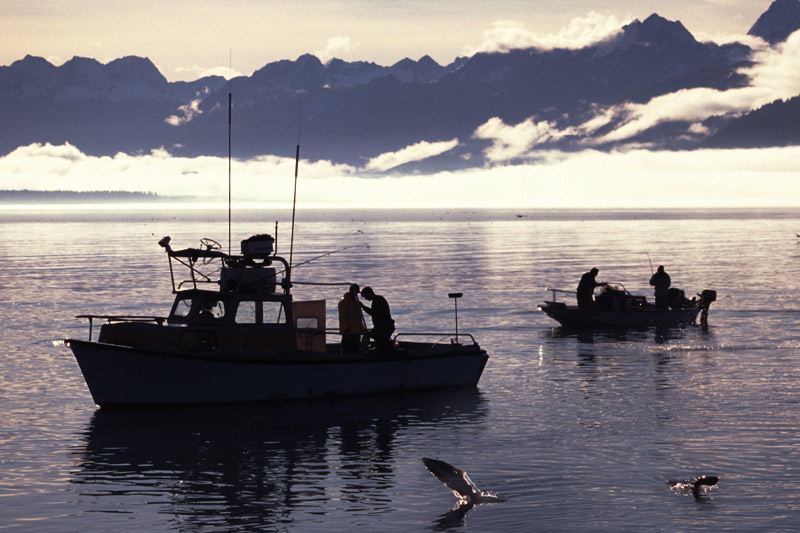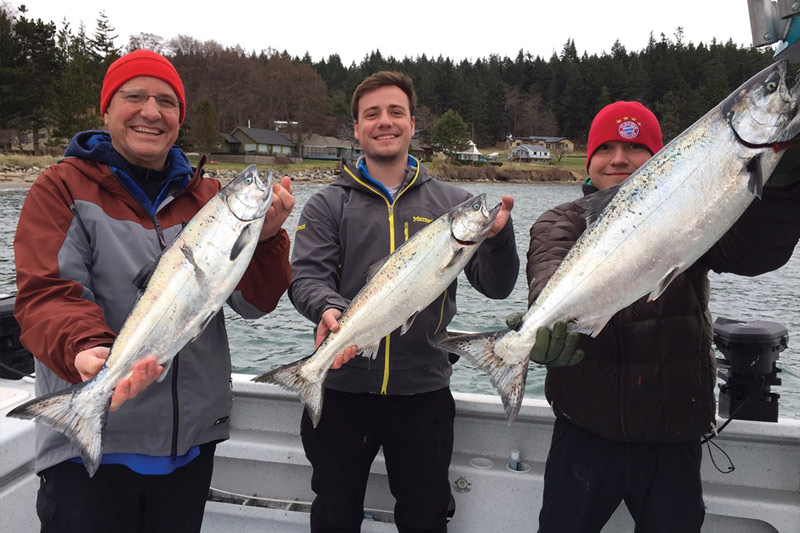
 There is no substitute for time on the water. However, I usually end with this advice: The best way to flatten your learning curve is to hire a charter. I’d like to offer some tips on finding a good guide, being a good client, and having a great experience while making lasting memories and gaining knowledge. Going on a charter can get folks hooked on fishing … that’s a good thing!
There is no substitute for time on the water. However, I usually end with this advice: The best way to flatten your learning curve is to hire a charter. I’d like to offer some tips on finding a good guide, being a good client, and having a great experience while making lasting memories and gaining knowledge. Going on a charter can get folks hooked on fishing … that’s a good thing!
Finding the best charter for the area and specific quarry you wish to pursue is now much easier with the advent of the internet. An online search for charters in the area you want to fish will pull up a plethora of information.
Check out the charter’s website and see if their company meets the necessary requirements. There may be no permitting or licensing needed in rivers, but there almost always will be in the salt. Make sure the operation looks legit and has the official accreditations. Online reviews can be a good source of information. If the charter has mostly positive reviews, it’s a good sign. A couple bad reviews can be taken with a grain of salt. There’s at least one in every crowd, right?
If you’re a social media user, look at the Facebook page for the business. Lots of smiling faces of happy clients? Lots of friends including past customers and other guides? It probably means they are doing something right and have been for awhile. Have they been in business for a few years? That’s a good sign. There are some good new guides out there with fresh attitudes and enthusiasm; however, longevity means consistent success. Pick up one of the regional magazines as well and peruse the charter advertisements.

Don’t discount good old word of mouth and ask around. If you’re already in the area you want to fish, stop by and talk to the locals on the docks or at the tackle shops. Call around a bit and look for recommendations. Other businesses won’t refer a guide for long if clients are coming back from the trip disgruntled. Also, just ask your friends, family, and co-workers. Put out the call. Has anyone had a fun, guided fishing trip? You’ll be surprised how many folks want to share their fish stories.
This piece of advice when choosing a charter is as important as any: What does the vessel look like that you’re going to fish on? Is it of the size and seaworthiness needed to safely fish in the area you wish? Is it in good condition? A new boat doesn’t always mean the best boat, but it should be in good repair. Is the boat clean and well maintained? No stories of multiple break downs? Probably a good thing. If you’re looking at pictures, do your best to judge if it looks like a vessel you would want to spend the day on if conditions turn rough. And maybe the most important for some customers—does it have a comfortable private head? Some fisher persons don’t mind roughing it, but some like creature comforts.
Once you’ve chosen a charter, you can help ensure the trip goes well with a little planning and effort. While you may not be the captain on a charter excursion, there are still some things under your control. Being a good client will lead to a good experience. If you’re the one who has booked the charter, take the point with your party and communicate with all members on what will be expected. As the saying goes, half of success is just showing up. If you’ve got a charter lined up, show up! “No Shows” are more common than you’d think in the guide business.
Clients not showing without notification is a direct drain on the business model. With notice, well in advance if you have to cancel, a charter can try to book another trip on that day. Without it, they can’t. Also, be prompt. The trip may be planned around an early bite or tide. Make sure to have your belongings organized and double check for everything you’re supposed to bring before you get to the boat.
However, make sure and leave the bananas at home, and bring something else for a snack. Fisherman are a superstitious lot and bringing bananas on a boat is an old, bad luck omen. It’s funny but may actually upset your guide. I’ve heard comical stories of a bad day of fishing explained by a client pulling a banana out from their pack at the end of the day. Don’t forget your fishing license! The current and correct one. Sometimes charters will take care of the licenses for you, but do your due diligence.
When on the charter, the captain is in charge. Even if you have some knowledge of the fishery, be humble and listen. Always pay attention to what he or she is telling you. If you’ve hired a good guide, chances are they’ve been on that body of water almost every day.
Be aware of your surroundings and try to keep your bearings. Be cognizant of the boat and its systems. You’re now somewhat in training to be the captain. Keep that in mind, but also keep out of the way when applicable. The captain and deckhand(s) may need room to operate. Ask questions when the time is right and there’s a break in the action. Pay attention to the gear you are using and try to focus. Tangles and missteps will happen, but mitigating confusion and downtime will lead to a more successful trip. Take mental notes on exactly what is happening. Ask the guide if he minds you taking pictures of the gear for future reference. You should already have that phone or camera with you to record that awesome catch you’re going to have.
If your charter captain says the trip should be cancelled due to weather, trust that they are making the right decision. Don’t complain, because it’s very likely you wouldn’t want to be out there anyway. The captain and crew want to go as bad as you do. If they don’t fish, they don’t get paid.
The same logic goes for river fishing. If the guide says the river is unfishable, or the fish just aren’t in yet, believe it. Being a guide is a great job when A) the weather and conditions are good; B) the fish are present and cooperating; and C) the clients are reasonable in their expectations and pleasant. Subtract any one of those ingredients from the equation and the trip can become a grind for everyone. It may be best to go another day.
Six-pack charters are probably the best way to gain on-the-water experience and knowledge before you pilot your first trip to the ocean or big river. Six-pack means up to six clients as regulated by permit or license. You can really get a good feel for what you should be doing as a captain on a boat of this size, these vessels are usually 23-33 ft. in length. It’s an intimate experience with somewhat close quarters. You may be able and even asked to run gear such as downriggers.

Take this opportunity to learn not just the “what” and “where” of fishing, but the “why.” A good captain will take the time and enjoy telling you why they are using a certain method, why they are fishing in a certain spot, and what it takes to be successful. Boats in this class are usually faster than the larger charters. They can often get you out to the fish and get you back in express fashion.
Larger charter boats with multiple parties have some advantages. Size means you may be able to fish in heavier weather than smaller vessels. You may have more room to stretch out and rest on long runs to the fishing grounds. Also, you’ll never plug the hold with fish on the big boats. Overnight trips for tuna are also possible on the 50-footers. These larger charters with more clients are generally less
expensive per person. They can be a lot of fun, but may not represent the most efficient learning experience if that is what you’re after.
Another type of charter is the destination lodge experience in B.C. or Alaska. While you may not fish these areas more than once or twice a year, you’re still gaining knowledge. Use what you gleaned from this northern adventure to put some tricks up your sleeve locally.
Plus, if you do come back to the same lodge, you’ll be one of the insiders who knows how to fish the area. The accommodations, service, and food can be extraordinary. You’ll pay a bit more for this experience. From the smaller, less expensive lodges of Vancouver Island to the large, helicopter-served awesomeness of the northern locales, there’s an experience for everyone. You’ll also meet people from all over. These are the trips that you’ll be talking about for a lifetime.
Going on a guided river trip provides a fun change of pace, whether it’s on the Columbia River on a 26′ sled or drifting down a stream in a 16′ drift boat. There are also some good opportunities to fish on the beautiful lakes of the Pacific Northwest with a guide. These freshwater trips are often some of the most relaxing and fun—reeling in nice fish without big-water pressures. Remember to tip your captain and deckhand if the trip has been satisfactory. No, that doesn’t mean to tip only if you catch something. Most likely they have done everything possible to catch fish. They want to be successful too because more fish equals more tips.
Customary tips range from 10-20% of the price of charter for the day. For most trips, $50-$200 is good. If on a six-pack charter, a good rule of thumb is for each customer to throw in $20 for the daily tip and if there’s a deckhand, tip him or her something as well. Go with your gut. If it’s been an amazing, huge, spectacular, beautiful trip … tip big!

The flip side is that rare occurrence of a bad charter or unprofessional operation. If you experience something that just feels wrong, don’t worry about the tip. A bad experience may warrant a bad review online. However, poor reviews carry a lot of weight. Use that power wisely and responsibly. If the guide is doing something unsafe or illegal, you may want to let someone know beyond a bad review. Something of this magnitude will probably never happen, but you never know. Use your own discretion and ask around regarding protocol if you’re concerned before taking action.
The charter captain or guide can be a valuable teacher during your excursion and a good source of information for the future. The guided trip should be a special and informative experience that you’ll remember forever. Relax and have fun—that’s what you’re paying for after all. Just remember, no bananas!